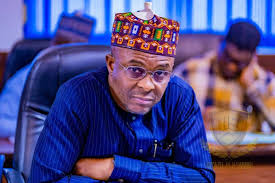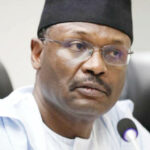Recent efforts by the Nigerian Ports Authority (NPA) to prioritize the Maritime sector have enabled Nigeria to position itself as the biggest force influencing maritime connectivity in the West African sub region.
In fact, the constant push by the Minister of Marine and Blue Economy, Adegboyega Oyetola, through the Managing Director of NPA, Dr. Abubakar Dantsoho, has greatly impacted maritime connectivity and has also generated considerable economic benefits for Nigeria.
It has further offered the nation’s seaports greater influence over the flow of goods in and out of the region.
Dantsoho is pushing to leverage the nation’s resources to further strengthen connectivity, with a key emphasis on enhancing port infrastructure.
Recent rise of Nigeria’s economy has largely been fueled by months of surging exports.
With Nigeria accounting for over 65 percent of Maritime Trade in West Africa, tapping into maritime shipping networks is now central to the Ministry of Marine and Blue Economy Strategy of export-led economic development.
That was why the recent tour of the nation’s seaports by Dr. Dantsoho was aimed at strengthening port facilities to enhance the flow of goods in and out of the country.
Nigeria is a major maritime nation in the Gulf of Guinea region. The country has about seven functioning seaports including Lagos Port Complex; Tin-Can Island Port Complex and Lekki Port all in Lagos State.
Others are the Calabar Port Complex in Cross River State; the Delta Ports in Warri, Delta State, the Rivers Port Complex and Onne Port Complex, both in Rivers State.
This is why Oyetola described the National Policy on Marine and Blue Economy framework as a well-rounded and inclusive policy framework that will enhance maritime governance and ultimately establish the sector as a key driver of national prosperity in line with Africa’s Agenda 2063.
The Minister made the assertion during the Second and Final leg of the Executive Technical Validation Workshop of the National Policy on Marine and Blue Economy held at the Abuja Continental Hotel.
He noted that the series of validation workshops and engagements in the past couple of months is aimed at redefining and producing a formidable framework that will serve as a blueprint to advance Nigeria’s maritime sector.
Oyetola acknowledged the Ministry’s vision for the sector, hence the assemblage of professionals ranging from industry experts, academics, and researchers.
This affirms and further reflects the Ministry’s dedication and commitment to the growth and development of the sector, Oyetola said.
Acknowledging the maritime domain as a crucial pillar of Nigeria’s future economy, the Minister harped on the importance of addressing the bond between the marine and blue economy sector side by side with economic growth while observing that an inclusive maritime policy portends the ability to position Nigeria as a leader in the global blue economy.
“This engagement aims to restore our priorities and solidify a framework for advancing the maritime sector over the next few years. As you are aware, a key factor in driving maritime development is the establishment of a strong policy framework,” Oyetola said.
On his part, the Permanent Secretary, Federal Ministry of Marine and Blue Economy, Oloruntola Olufemi, said the final and executive validation workshop was to harp on the gains and achievements of the previous engagement.
Oloruntola further stated that the marine industry is fast gaining economic relevance and changing the fortunes of many nations on a global scale.
He added, “This workshop is an opportunity to consolidate those efforts and finalise a framework that will guide the sustainable growth of the Blue Economy in Nigeria. Over the past few months, we have witnessed the growing significance of the marine sector in global discourse.
“As we face the challenges and opportunities that lie ahead, this policy represents a forward-thinking approach to harnessing the immense potential of our blue economy.”

 Join Daily Trust WhatsApp Community For Quick Access To News and Happenings Around You.
Join Daily Trust WhatsApp Community For Quick Access To News and Happenings Around You.


